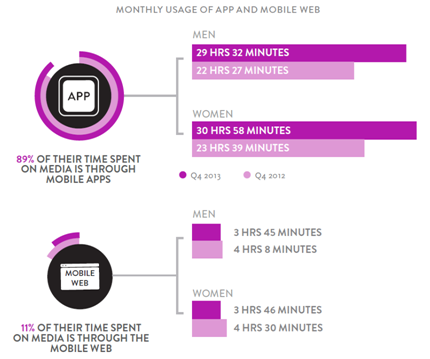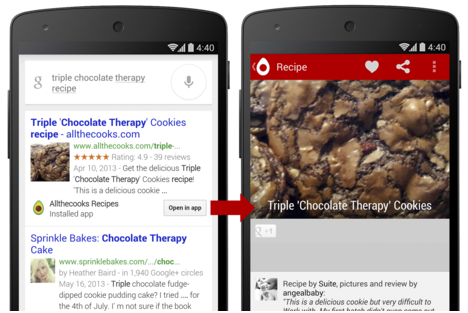So, we’re inundated with a plethora of mind boggling global mobile statistics. In fact, to add one to the list, the global smartphone market exceeded 1 billion shipments in a year for the first time in 2013. That’s a 38.4% year on year increase driven by developing markets, such as China and India; plus the plunging cost of Android devices and larger screen sizes, according to IDC.
Having a global mobile strategy has never been more important, but how do you engage with this audience? You have a responsive website that can just about anything an app can, right? I’ve heard this statement time after time and it totally misses the point of why apps are so important.
This month, Nielsen has published their findings on how much time is spent on various media channels, including mobile devices. On average, US Smartphone users spent a staggering 89% of their time on mobile apps, compared to browsing the mobile web, which only accounted for 11% of time spent. This tendency towards using mobile apps has actually increased between Q4 2012 and the same period for 2013. This trend is also backed up by recent data from app analytics company, Flurry, which found that in 2014, 86% of US mobile users time is spent in-app; a year on year increase of 6 %. Not only that, but users are spending an average of 4 minutes more per day on mobile, than a year ago, meaning an additional 12 minutes per day is spent using apps.
People LOVE to personalise their smartphones with apps that best reflect and enhance their lives. It also helps that apps often provide a slicker user experience on mobile and take up less data than their HTML5 equivalents.
Nielsen also found that on tablets a larger proportion of users are spending of their time on the mobile web (19%), compared to smartphone users (11%). However, tablets have larger screen sizes, providing a better user experience for web browsing. But the fact still remains, that the lion’s share of time spent on tablets in on mobile apps.
Mobile is changing the way we search and the search engines are adapting
Since the mobile web is ‘swimming in a sea of apps’, it would seem this has an impact on the way we search on mobile devices; if you want a video, you go straight to the YouTube app, right? You want to book a table; you go to one of many restaurant booking apps, and so on….there seems to be an app to cover all the relevant verticals.
Google are making strenuous efforts to link the mobile web and app worlds – Google already allows search result to filter for apps and indexes app store pages to allow mobile users to go directly to the point of install. Recently however, Google has taken all this a step further, by beginning to index the content of apps themselves, by allowing developers to point from their website, to the relevant in-app location. Links to the app content will appear as a button when searching on a mobile device:
So, Google is not only helping end users discover new apps through the search results, but sending users directly to the app user experience!
If you want to find an app, specifically, the must go-to place is the app store, rather than Google search, or equivalent. Thus it’s a no-brainer for marketing efforts to include optimising your app store page. Companies seeking to distribute their apps abroad need to research the most popular app stores in a given country – many developers wishing to target China, don’t realise that Google Play is widely blocked! If businesses want their apps to be found at all internationally, then their app store page must be fully localised and targeting the most relevant keywords used locally.
Apps can drive customer acquisition and enhance brand loyalty
Given the many possibilities offered by mobile technology and innovative developers, it’s hardly surprising that organisations are creating apps for different things; contributing to the customer sales cycle at different stages. A survey conducted by Adobe and Forbes of senior executives at global companies, found:
- For 83% of respondents, the main purpose of their customer facing apps was to enhance overall communications with their customers.
- 79% said they use apps to provide customer service and support.
- 74% use apps as lead generators, containing virtual product brochures.
- 67% said that their apps were aimed at enhancing brand engagement.
- 69% stated their apps were used to facilitate transactions.
As for the intended role of apps in the sales cycle, nearly one fifth reported apps being most crucial for generating brand awareness early on. 22% saw apps contributing at the consideration stage to be most important, while 28% thought it was supporting the purchasing stage. This could mean that NOT having an app may result in losing out to competitors in the all-important decision-making process.
The main area apps are seen as having the biggest impact, with 31%, is in enhancing post-purchase customer loyalty. After all, it’s just as important to retain a customer, than it is to win a new one. Arguably there’s few better ways of keeping customers engaged, than by being installed on their trusty mobile companion.
App downloads are set to explode
Forbes and Adobe found that top reasons among executives for developing customer facing apps were that more of their user base now have access to mobile devices (54% of survey respondents) or that they were making apps mandatory for some functions (53%); but the top reason was to make more services and content available exclusively through apps (62%), meaning apps are being seen as channels in their own right. According to Juniper research, app downloads are expected to increase, or rather double, from 80 billion to 160 billion between 2013 and 2017. Portio Research believes this increase will be more like two and a half times over the same period. Whatever it is, the increase will be huge and developers and companies are flocking to get a slice of the action. Both Google Play and App App Store hit the 1 million app landmark in 2013 and competition has been hotting up in some categories and becoming quite cut-throat in others.
If you’ve tried an app but have been less than impressed by the results, then perhaps it’s time to look at the competition and question your strategy? To ignore apps entirely, might not be fatal, but almost criminal. If you lack the skills and resources necessary, or you’ve inadvertently found the wrong developers, then perhaps now’s the time to find help from a 3rd party? Without a doubt, the mobile era is here and users are clearly turning to apps as their preferred format, to the extent that a large proportion of top executives are making apps core aspects of their marketing and communication strategies.








[…] in March, Webcertain published a post looking at the importance of mobile applications in Global Mobile Strategies, so I thought I would build on this and introduce to you five easy tips to help you localise your […]
[…] See on blog.webcertain.com […]
[…] Are you giving your global mobile strategy the respect it deserves? Read on to discover why it's become essential to have an app if you want to succeed. […]